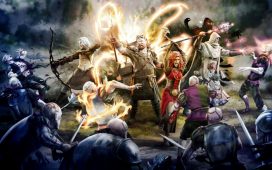There is no single objective history of video games. There are certainly elements we can all agree on – the order in which home computers and consoles were launched, the general sweep of technology, from blocky monochrome sprites to vast realistic landscapes – but everyone who plays games holds within them a completely different version of events, based on the machines they owned and the games they loved.
My own history started with arcade machines on the Blackpool seafront in the early 1980s. In 1984, my dad bought a Commodore 64, and a little later I started helping my friend design games for the Dragon 32. I spent my first ever pay cheque on an Atari ST, and then my dad bought our first console, a Mega Drive, which I still have. When I went to university in 1991, I got into PC games, largely because I lived with two computer scientists who set up a LAN in our house so that we could play Doom together. Afterwards, I joined Edge magazine and our key platforms were PlayStation, Saturn and 3DO – but we also had a Neo Geo and a PC Engine in the games room. At the close of the 20th century, I was a Dreamcast fanatic until I folded and embraced the PS2. I was an Xbox 360 player much more than PS3, but I was PS4 more than Xbox One. I’ve always taken a slalom approach.

This route has completely coloured my understanding of games history. On the C64, I played glossy, technically brilliant titles such as Impossible Mission, Paradroid and Last Ninja with colourful visuals that took advantage of the machine’s power and hardware-supported sprites. I missed many of the idiosyncratic ZX Spectrum hits: Dizzy, Horace, and all those isometric adventures from Ultimate. The Mega Drive meant that I was into arcade conversions, licensed sports sims and Sonic the Hedgehog, rather than Mario, Metroid and Final Fantasy. I hardly played any N64 games at Edge, sticking with the big PlayStation titles, so my history sidesteps Mario 64, Super Smash Bros and Star Fox in favour of Resident Evil, Ridge Racer and Silent Hill. To me, the 1990s was about games becoming darker and more mature; our video games editor Keza MacDonald’s console timeline is SNES, N64, Game Boy Color, GameCube, meanwhile, so she might have spent that same era playing Mario Party, Zelda, Pokémon and Banjo Kazooie, thinking that games were becoming more sociable and accessible. We were both right, of course.
Your timeline of console ownership prepares you for the future of gaming in different ways. Any kid lucky enough to get an MSX in the 1980s would have been a lot less surprised by Metal Gear Solid in 1998, because Hideo Kojima’s first two Metal Gear games appeared on that cult computer. Lots of the conventions found in current open world role-playing adventure games will look extremely familiar to PC gamers of the 1990s who played Deus Ex, System Shock and Thief, from which a lot of modern designers are still borrowing ideas. The blossoming of weird, subjective indie games in the 2000s doesn’t seem as surreal to Speccy owners who were playing Deus Ex Machina, Frankie Goes To Hollywood or Rock Star Ate My Hamster in the 80s.
History, as the saying goes, is told by the victors, so I suppose a lot of my ideas about the history of games are shaped by the fact that I owned a lot of best-selling machines. I wonder how I’d have thought about the industry if I’d owned, say, a TRS-80, then an Acorn Archimedes, followed by a PC Engine, an FM Towns Marty, an Apple Macintosh … all my reference points would be completely different. Will the value of games made for the Philips CDi or Casio Loopy or Atari Lynx one day be reassessed by historians who aren’t so swayed by the dominant legacy of Sony, Nintendo and Sega?

One thing is certain: you take every game you’ve ever played into every new game you try. That one sword in Elden Ring, that castle in Assassin’s Creed, that weird character in Breath of the Wild – they take us back to past experiences; things perhaps only you remember. It is a distinct pleasure to be reminded of beautiful things, to be able to draw comparisons and create little networks of our own experiences. And the sheer messiness of the games industry, with its many technological dead ends, failed offshoots and lovable diversions, has allowed a richness of memory to unfold. Your route through games, just like your route through books, through movies, through sports you played or watched, has shaped you.
There is no grand narrative. It’s only by talking to other players, sharing stories and memories, that the picture begins to emerge.














